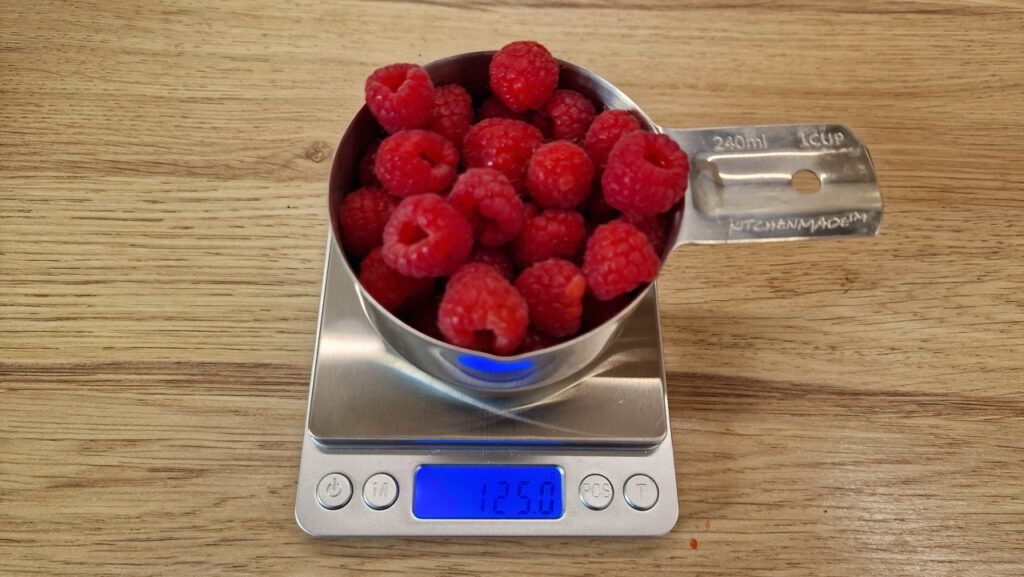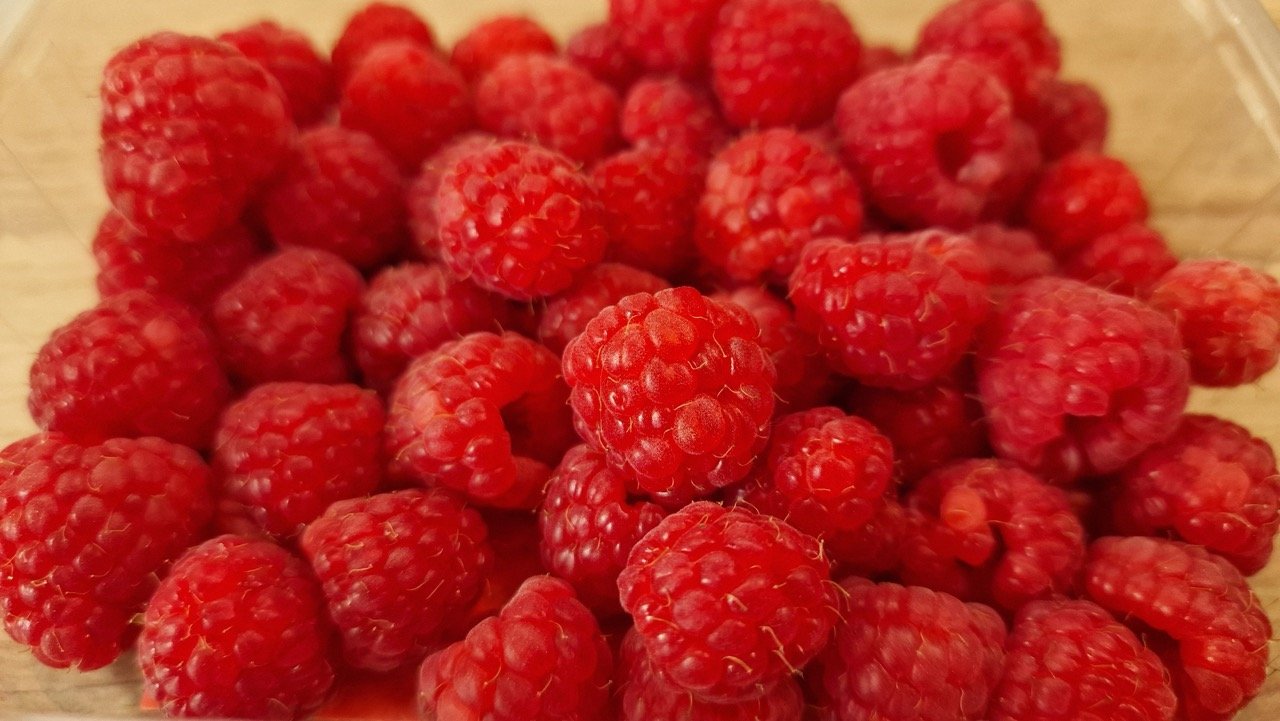Measuring ingredients precisely is key in the culinary world, particularly when dealing with delicate items like raspberries. These berries are a favorite in many dishes, from desserts and jams to salads and sauces. Given their size, texture, and the fact that they can be used fresh or frozen, accurate measurement of raspberries is crucial to ensure the right balance of flavors and textures in any recipe.
This article will explore the various methods for measuring raspberries using different units such as cups, grams, ounces, and tablespoons, helping you to achieve consistent and successful results in your cooking and baking.
Understanding Raspberry Measurements
Overview of Common Measurement Units
- Cups: Commonly used in recipes that call for large quantities of raspberries, particularly in baking and dessert-making.
- Grams: Offers precision that is critical in recipes where the exact amount of raspberries can impact moisture and flavor balance.
- Ounces: Useful for measuring raspberries when recipes specify weight for consistency in results.
- Tablespoons: Ideal for smaller additions of raspberries, such as in yogurt or as a garnish.
Why Raspberry Measurements Can Be Tricky
Raspberries are particularly challenging to measure accurately because of their varying size and the fact that they are highly compressible. When measured in cups, they can easily be squished, leading to inconsistent volumes. Additionally, the juiciness and moisture content of raspberries can vary significantly, affecting how they interact with other ingredients in recipes.
Practical Measurement Tips
How to Measure Raspberries Accurately
- Using Kitchen Scales: For recipes requiring precise balance of flavors and textures, measuring raspberries by weight (grams or ounces) is the most reliable method. This avoids the inaccuracies that can arise from compressing the berries in volume measurements.
- Proper Way to Fill a Measuring Cup: When using cups, gently pour the raspberries into the measuring cup and avoid pressing down on them.
Adjusting Recipes
The amount of raspberries in a recipe can influence not only the flavor and color but also the moisture content of the dish. If a recipe turns out too wet or mushy, reducing the number of raspberries or adjusting the other liquid ingredients might be necessary. Alternatively, if the result is too dry, adding more raspberries can provide additional moisture and enhance the berry flavor.
Nutritional Benefits of Raspberries
Raspberries are not only delicious but also packed with nutritional benefits that enhance their appeal:
- Fiber: High in dietary fiber, raspberries help in digestive health and maintaining a healthy weight.
- Vitamins and Minerals: Rich in vitamin C, manganese, and antioxidants, raspberries support the immune system and promote healthy skin.
- Antioxidants: They contain powerful antioxidants such as quercetin and ellagic acid, which have anti-inflammatory properties and can help reduce the risk of chronic diseases.
- Low in Calories: Raspberries are low in calories but high in flavor, making them a great choice for a healthy diet.

Raspberry Conversion Tables And Formulas
Most Common Conversions for Raspberry
- 1 teaspoon of raspberry: 3 grams.
- 1 tablespoon of raspberry: 8 grams.
- 1 US cup of raspberry: 125 grams.
- 1 UK cup of raspberry: 130 grams.
Raspberry US Cups to Grams and Ounces
| US Cups of raspberry | Amount in grams (g) | Amount in ounces (oz) |
|---|---|---|
| 1/8 cup | 16 g | 0.55 oz |
| 1/4 cup | 31 g | 1.1 oz |
| 1/3 cup | 42 g | 1.47 oz |
| 3/8 cup | 47 g | 1.65 oz |
| 1/2 cup | 63 g | 2.2 oz |
| 5/8 cup | 78 g | 2.76 oz |
| 2/3 cup | 83 g | 2.94 oz |
| 3/4 cup | 94 g | 3.31 oz |
| 7/8 cup | 109 g | 3.86 oz |
| 1 cup | 125 g | 4.41 oz |
| 2 cups | 250 g | 8.82 oz |
| 3 cups | 375 g | 13.23 oz |
| 4 cups | 500 g | 17.64 oz |
| 5 cups | 625 g | 22.05 oz |
| 6 cups | 750 g | 26.46 oz |
| 7 cups | 875 g | 30.86 oz |
| 8 cups | 1000 g | 35.27 oz |
| 9 cups | 1125 g | 39.68 oz |
| 10 cups | 1250 g | 44.09 oz |
Raspberry UK Cups to Grams and Ounces
| UK Cups of raspberry | Amount in grams (g) | Amount in ounces (oz) |
|---|---|---|
| 1/8 cup | 16 g | 0.57 oz |
| 1/4 cup | 33 g | 1.15 oz |
| 1/3 cup | 43 g | 1.53 oz |
| 3/8 cup | 49 g | 1.72 oz |
| 1/2 cup | 65 g | 2.3 oz |
| 5/8 cup | 81 g | 2.87 oz |
| 2/3 cup | 87 g | 3.06 oz |
| 3/4 cup | 98 g | 3.44 oz |
| 7/8 cup | 114 g | 4.02 oz |
| 1 cup | 130 g | 4.59 oz |
| 2 cups | 260 g | 9.19 oz |
| 3 cups | 391 g | 13.78 oz |
| 4 cups | 521 g | 18.37 oz |
| 5 cups | 651 g | 22.96 oz |
| 6 cups | 781 g | 27.56 oz |
| 7 cups | 911 g | 32.15 oz |
| 8 cups | 1042 g | 36.74 oz |
| 9 cups | 1172 g | 41.34 oz |
| 10 cups | 1302 g | 45.93 oz |
Raspberry Tablespoons to Grams and Ounces
There is now real practical use in measuring raspberry with a tablespoon. However, for complete conversion rates we give you the theoretical tablespoon measurements in grams.
| Tbsp of raspberry | Amount in grams (g) | Amount in ounces (oz) |
|---|---|---|
| 1/4 tbsp | 2 g | 0.07 oz |
| 1/3 tbsp | 3 g | 0.09 oz |
| 1/2 tbsp | 4 g | 0.14 oz |
| 1 tbsp | 8 g | 0.28 oz |
| 2 tbsp | 16 g | 0.55 oz |
| 3 tbsp | 23 g | 0.83 oz |
| 4 tbsp | 31 g | 1.1 oz |
| 5 tbsp | 39 g | 1.38 oz |
| 6 tbsp | 47 g | 1.65 oz |
| 7 tbsp | 55 g | 1.93 oz |
| 8 tbsp | 63 g | 2.2 oz |
| 9 tbsp | 70 g | 2.48 oz |
| 10 tbsp | 78 g | 2.76 oz |
Raspberry Teaspoons to Grams and Ounces
There is now real practical use in measuring raspberry with a teaspoon. However, for complete conversion rates we give you the theoretical teaspoon measurements in grams.
| Tsp of raspberry | Amount in grams (g) | Amount in ounces (oz) |
|---|---|---|
| 1 tsp | 3 g | 0.09 oz |
| 2 tsp | 5 g | 0.18 oz |
| 3 tsp | 8 g | 0.28 oz |
| 4 tsp | 10 g | 0.37 oz |
| 5 tsp | 13 g | 0.46 oz |
| 6 tsp | 16 g | 0.55 oz |
| 7 tsp | 18 g | 0.64 oz |
| 8 tsp | 21 g | 0.73 oz |
| 9 tsp | 23 g | 0.83 oz |
| 10 tsp | 26 g | 0.92 oz |
Metric vs. Imperial Conversions
When working with raspberry in the kitchen, it's essential to be adept at converting between the metric and imperial systems of measurement. This skill ensures accuracy in following recipes from different culinary traditions around the world.
The metric system, commonly used around the world, measures raspberry primarily in grams and kilograms. This system is favored for its simplicity and ease of scaling.
Predominantly used in the United States, the imperial system measures raspberry in tablespoons and teaspoons. While not as straightforward as scaling, it is deeply integrated into many traditional American recipes.
Common Measurement Units for Raspberry
Raspberry can be measured by either volume or weight. Ingredients that come in large pieces, such as raspberry, are the worst to be measured by volume (e.g. cups). Cups measurement for raspberry are very unreliable, different measurements can differ by even more than 20%. Use a kitchen scale instead for precise measurement.
Most typical volume measurements for raspberry are:
- Teaspoons (tsp)
- Tablespoons (tbsp)
- Cups
Most typical weight measurements for raspberry are:
- Ounces (oz)
- Grams (g)
- Kilograms (kg)
- Pounds (lbs)
How We Measure Raspberry?
To make sure that our conversion rates are correct, we don't just copy data from other websites. We actually take at least 5 different measurements of 1 cup of raspberry and use the average for calculations and conversion tables. Read more on our measurement methodology by clicking on this link.

